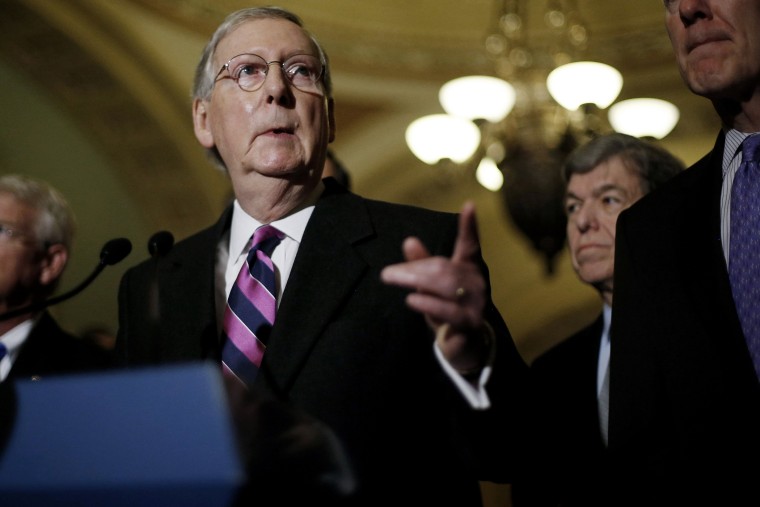The new Congress had barely blinked awake when Republicans got back to their usual business -- an abortion ban.
The Hill reports that on Monday, the first day of the new session, Rep. Trent Franks and Rep. Marsha Blackburn reintroduced the tendentiously named "Pain Capable Unborn Child Protection Act." It bans abortion after 20 weeks on the medically-disputed theory that fetuses can feel pain at that point.
RELATED: Under Republican rule, a record number of abortion restrictions
President Obama has already promised to veto the bill if it ever reaches his desk. The Ninth Circuit Court of Appeals has already ruled that Arizona's version of the ban is unconstitutional, and a year ago, the Supreme Court declined to say otherwise. But of course, there's something different this time. Throughout 2013, then-Senate Majority Leader Senator Harry Reid refused to let the bill hit the floor there.
But new leader Mitch McConnell is far more sympathetic to it. He has repeatedly signaled his support for putting the bill to a vote in the Senate, telling anti-abortion activists in June, "For six years, the president has been isolated from this growing movement. He will be forced to listen to the cause that's brought us all here this morning. Senate Democrats would be forced to take a stand."
McConnell's words, part of a well-honed political strategy, were telling. After all, such abortions make up only about 1% of the overall total. (They also often involve desperate circumstances.) And supposed fetal pain has nothing to do with why activists oppose abortion at all stages of pregnancy. But Republicans have long been itching to replay their public relations successes of previous years, forcing through legislation about rare later abortions and then painting pro-choice Democrats as extreme.
The classic example of this was the Partial Birth Abortion Ban, an act of pure political theater, banning a specific, rare abortion procedure without an exception for women's health. Bill Clinton vetoed the bill in 1996, but a Republican Congress handed it back to George W. Bush, who signed it in 2003. Along the way, the public was treated to grisly images of later abortions, which made Democrats squirm. (Sixteen Democratic senators eventually voted for the last version of the Partial Birth Abortion Ban, which was upheld by the Supreme Court four years later.)
RELATED: Texas abortion showdown has national implications
Republicans are now surely feeling confident after a focus on reproductive rights didn't deter a GOP wave in the midterm elections, including in purple Colorado. And the optics have improved, too. Thanks to that election, they've gone from two anti-abortion women in the Senate, Sen. Kelly Ayotte and Sen. Deb Fischer, to four, with the addition of Sen. Joni Ernst of Iowa and Sen. Shelly Moore Capito of West Virginia. Capito ran as a moderate, but has already voted for the House version.
Meanwhile, one way or another, the Supreme Court is expected to address the abortion issue after long avoiding it. Ever since Justice Anthony Kennedy expressed his distaste for later abortions in Gonzales v. Carhart, the decision upholding the Partial Birth Abortion Ban, anti-abortion legal strategists have been hoping to use a 20 week ban to chip away at Roe v. Wade.
The irony is that the state-level abortion restrictions that have wildly proliferated since Republicans took control of state governments across the country are poised to have a far bigger impact on women accessing abortion, because many such laws are actually shutting down clinics. Twenty-week bans are already commonplace in states; the Guttmacher Institute notes that nine states have such bans on the books, though some are either temporarily or permanently blocked by litigation.
In other words, it's an old fight, but with new players. And for Republicans, it's a long game.
